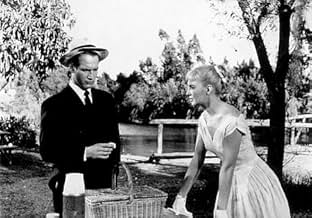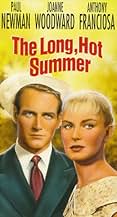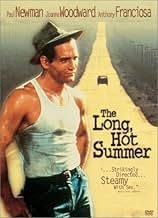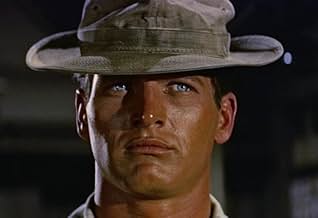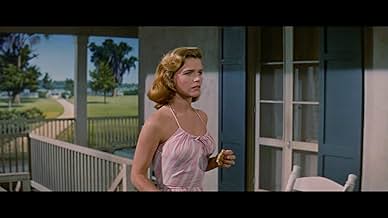Acusado como pirómano de graneros y estafador, Ben Quick llega a un pequeño pueblo de Mississippi y rápidamente se hace amigo de la familia más rica, los Varner.Acusado como pirómano de graneros y estafador, Ben Quick llega a un pequeño pueblo de Mississippi y rápidamente se hace amigo de la familia más rica, los Varner.Acusado como pirómano de graneros y estafador, Ben Quick llega a un pequeño pueblo de Mississippi y rápidamente se hace amigo de la familia más rica, los Varner.
- Dirección
- Guionistas
- Elenco
- Premios
- 2 premios ganados y 4 nominaciones en total
- Lucius
- (as William Walker)
- Ambulance Driver
- (sin créditos)
- Man at Auction
- (sin créditos)
- Man at Auction
- (sin créditos)
- Man at Auction
- (sin créditos)
- Linus Olds
- (sin créditos)
- Woman at Auction
- (sin créditos)
- Dirección
- Guionistas
- Todo el elenco y el equipo
- Producción, taquilla y más en IMDbPro
Opiniones destacadas
People will create a storm in a small and very hot town. This storm is full of greed, hate, lies and misunderstandings. The scenario is not bad. The sharp dialogues are tense and full of bitterness, contempt and sarcasm. Honesty is somewhat present, but it can not come to the fore. The atmosphere is constantly stretched through sexual charge and wild whim of individual protagonists.
The acting is good, but the chemistry between the main protagonists could have been a lot better.
Paul Newman as Ben Quick is determined and resourceful young man who will try to deceive members of one family in order to become the successor of wealth. His character is furious and disturbing. Real trouble in the city. However, he becomes a victim of his own manipulations and hidden vulnerabilities. Joanne Woodward as Clara Varner is an independent woman who is able to confront a brazen intruder and a vile old man. Her biggest weakness is "forlorn hope". It is difficult to deal with one's own own life ideals and the coming sexual attraction. Clara is the central figure in this film. Her performance is quite touching.
Orson Welles as Will Varner is a stubborn and vulgar local tycoon. Anthony Franciosa as Jody Varner is a weak son, who fought for his father's love. Lee Remick as Eula Varner is playful daughter in-law.
The last scenes are quite inconclusive. Birds of prey are quickly tamed and harnessed. They have to face the truth in crucial moments. Their confrontation was inevitable. However, melodramatic, generous and warm ending is a big flaw of this film.
Based on some William Faulkner short stories, The Long Hot Summer commences when Joanne Woodward and Lee Remick, daughter and daughter-in-law of local patriarch Orson Welles give drifter Paul Newman a lift into town. Woodward's a repressed school teacher and Welles despairs of her finding a suitable match.
Because he started dirt poor and worked his way up to the top, Welles takes a liking to Newman and pushes, a little too hard for Newman and Woodward to team up. That's not sitting real well with Anthony Franciosa who is Welles's son and sees Newman displacing him in the family pecking order.
In fact my favorite in the film is Franciosa, he usually is in any film he's in. When he's on the screen, you don't pay attention to anyone else, not even Orson Welles.
Welles borrows a bit from Tennessee Williams's Big Daddy Pollitt from the Paul Newman film the year before, Cat On a Hot Tin Roof. His Will Varner though is a bit softer around the edges, also lends itself more easily to caricature. I think the creators of The Dukes of Hazzard used Welles in The Long Hot Summer as their model for Boss Hogg.
In fact it's interesting to see the contrast in The Long Hot Summer and Cat On a Hot Tin Roof. It's obvious to me that William Faulkner liked the people of Mississippi a whole lot more than the southerners that are in Tennessee Williams's work.
Almost fifty years later, The Long Hot Summer is still enjoyable viewing and still may be the best of Paul and Joanne's joint ventures.
Although the plot is definitely familiar territory, and the script errs fairly strongly on the affected style customary to the post-Actors Studio era, the story resonates truthfully and remains engaging throughout, while the alluring undercurrent of barely-bridled sexuality keeps the proceedings energetic and urgent. Ritt's direction is taut but unfussy, allowing the inherent claustrophobia and tension of the film's small-town setting to speak for itself, and the sumptuous Technicolor cinematography is so crisp you can practically smell the marsh and sweat from the Mississippi bayou (and I'm not even just talking about Orson Welles). Although the climax feels like a somewhat forced attempt to escalate the stakes simmering throughout, with an overly hasty resolution to boot, the buildup is calm and confident enough to make the viewing experience worth its while without having to fight to engage its audience.
Naturally, like the majority of its contemporaries, the story ultimately exists as a vehicle to foreground the performances of the cast, who are what ultimately make the film worthwhile. Paul Newman, cementing his iconic identity as the shrewd, laconic, effortlessly cool drifter, crackles with charisma as accused arsonist Ben Quick, magnetic throughout even before his surprisingly racy shirtless scene. Joanne Woodward gives arguably the film's strongest performance as the controversially unmarried Clara Varner, practically vibrating in place from a lifetime of feeling discounted and under-appreciated. Rather than playing up her predicament, however, Woodward embodies Clara with a steely confidence, which is altogether more effective and appealing. In contrast, Orson Welles delivers the film's most legendarily outlandish performance as the resident belligerent patriarch. Notoriously mocking the Actors' Studio by mumbling almost incomprehensibly through his cartoonish southern drawl, the vociferous Welles is skilled enough to steal scenes in his sleep (which he may well have been during certain scenes), outrageously fun when hamming it up, with occasional pockets of surprising solemnity and depth, as if coming up for air from his customary grunting and snorting. Anthony Franciosa is also a sturdy presence, even if he does occasionally overindulge in Method hand-wringing and hysteria, while a cameo from the delightful Angela Lansbury as Welles' cheerily aggressive suitor adds a dash of comedic perfection.
While it may fall short of the acerbic intensity of similar fare such as Cat on a Hot Tin Roof, The Long, Hot Summer still serves a healthy slice of all the smouldering, robustly acted 1950s melodrama you could ask for. If only for the incandescent interplay between Newman and Woodward, with the added pleasure of cartoon-character Welles, the film is easily worth sinking into, on a dozy, hot summer evening or otherwise.
-7/10
"The Long, Hot Summer" (1958) is based on five short stories and a novel by one of the America's greatest novelists and storytellers, the expert of Southern life, William Faulkner, and the film is a steamy, moving, often funny (perhaps, unintentionally) tale of lust, greed, jealousy, and larger than life personalities and their clashes. I guess I need to read more Faulkner's stories because I was surprised to see the film that is based on the works of the writer known for his heavy use of such sophisticated literary techniques as symbolism, allegory, and especially stream of consciousness, the film which linear narrative is easy to follow from the third person point-of-view.
Besides Paul Newman who was as talented as he was hot, his off- screen wife-to-be Joanna Woodward shines as Clara Varner, Will's intelligent, thinking daughter, the teacher in a local school whom her father wants to see married (and not just wants but takes certain steps that Clara does not like and feels offended by). The film was the first of many Newman's and Woodward's collaboration and it is not easy to recall the greater chemistry between two leads. Orson Welles dominates the screen in his every scene as expected. 21-years-old Lee Remick (Eula, Varner's daughter-in-law, sexy and innocent woman-child), Anthony Franciosa (Jody, Varner's overlooked and jealous son), and Angela Lansbury (Minnie, the woman who has her own plans about future that include a widower Varner in them) all add to the sizzling fun that "The Long Hot Summer" is.
It's a lushly produced film about a drifter, Ben Quick (Newman), who comes to town. His reputation precedes him, and he soon upsets the status quo in the wealthy Varner family, headed by Orson Welles with a fake nose that kept melting off and an even faker southern accent.
There's the weak, insecure son (Franciosa) married to a sex kitten (Remick) and an unmarried daughter (Woodward) saving herself for a momma's boy (Anderson). In town, there's also Varner Sr.'s mistress, played by Angela Lansbury.
Ben sets his sights on Clara Varner and puts himself in direct competition with nervous son Jody for papa's approval. But Quick ultimately needs to reach underneath his swagger and bravura and confront his cut and run philosophy.
This is a fantastic cast that delivers sparkling dialogue and an interesting story that has mostly well-drawn characters. The exception would probably be Remick, who has a small but showy role. She doesn't get to do much except show off her figure and sexiness.
Welles is a riot - a marvelous technician, he knew how to externalize a character perfectly, and he is here the epitome of a Big Daddy type. His southern drawl is outrageous, and why he decided he needed a new nose (which he had in other roles as well) is beyond me.
Woodward gives a touching performance as a young woman who has been living on hope and can't quite cope with her attraction to the overtly sexual Quick. Franciosa is excellent as a tortured young man unable to win his father's love.
But as any film that stars Paul Newman, the movie belongs to him, one of the greatest actors to ever hit the screen. Macho, sexy and handsome, his Ben Quick is angry, determined, manipulative, and disturbing, with a hidden vulnerability.
His scenes with Woodward sizzle, and you can see her character blossom under his attention. They're a great couple, both on and off the screen.
Highly recommended, as is any film that stars Paul Newman.
¿Sabías que…?
- TriviaDirector Martin Ritt was forever known after this movie as the man who tamed Orson Welles. During filming, Ritt drove Welles to a local swamp, kicked him out of the car and forced him to find his own way back.
- ErroresWhen Varner sees Jody digging in the yard looking for so called treasures, Jody hands him a silver dollar and Will says it was minted in 1910. No silver dollars were minted between 1904 and 1921. The coin Ben showed him while at gunpoint was likely a $5 gold piece but Will is holding what looks like a silver dollar.
- Citas
Clara: Mr. Quick, I am a human being. Do you know what that means? It means I set a price on myself: a high, high price. You may be surprised to know it, but I've got quite a lot to give. I've got things I've been saving up my whole life. Things like love and understanding and-and jokes and good times and good cooking. I'm prepared to be the Queen of Sheba for some lucky man, or at the very least the best wife that any man could hope for. Now, that's my human history and it's not going to be bought and sold and it's certainly not gonna be given away to any passin' stranger.
- ConexionesEdited into El gran showman (2017)
Selecciones populares
Detalles
- Fecha de lanzamiento
- País de origen
- Idioma
- También se conoce como
- Dugo toplo ljeto
- Locaciones de filmación
- Clinton, Luisiana, Estados Unidos(town: Frenchman's Bend)
- Productora
- Ver más créditos de la compañía en IMDbPro
Taquilla
- Presupuesto
- USD 1,500,000 (estimado)
- Tiempo de ejecución
- 1h 55min(115 min)
- Color
- Relación de aspecto
- 2.35 : 1


